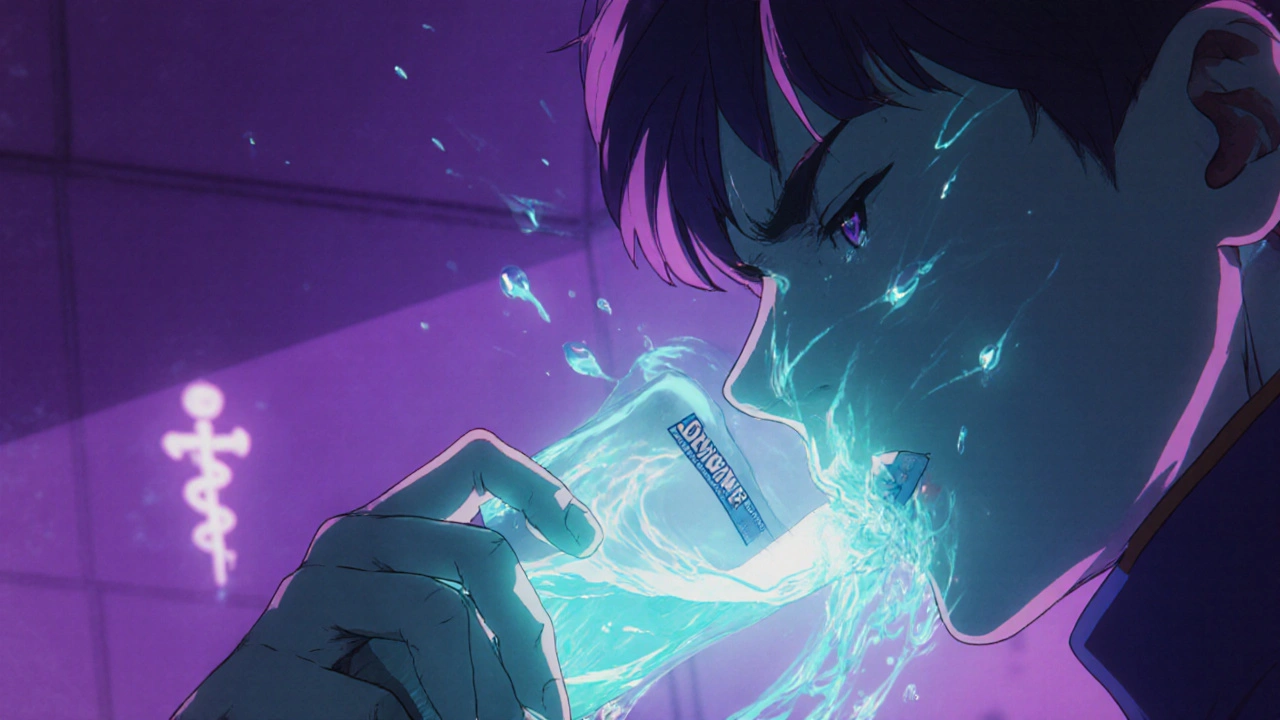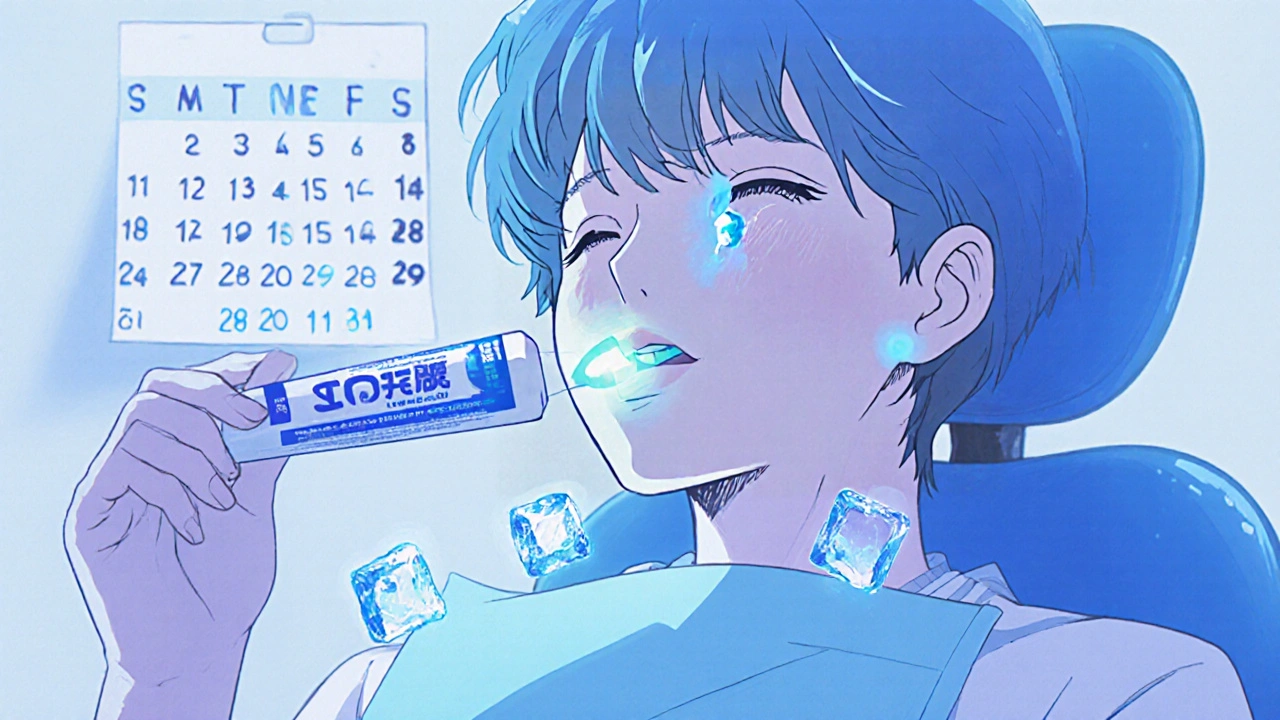Mouth Sores Risk Assessment Tool
This tool estimates your risk of developing mouth sores from medications based on key factors from recent medical research. Results are based on clinical guidelines and may vary by individual. Always consult your healthcare provider for personalized advice.
Assess Your Risk Factors
Your Risk Assessment
Why Your Medication Is Causing Mouth Sores
If you’re on chemotherapy, radiation, or certain immune drugs, and you’ve started getting painful sores in your mouth, you’re not alone. These aren’t just random canker sores-they’re oral mucositis, a direct side effect of how these treatments work. They happen because the drugs don’t just target cancer cells. They also damage the fast-growing cells lining your mouth, throat, and digestive tract. This leads to redness, swelling, open ulcers, and severe pain-sometimes so bad you can’t eat, drink, or talk.
The severity varies. Some people get mild redness; others develop deep, bleeding ulcers that last for weeks. According to a 2022 NIH review, between 20% and 100% of cancer patients on certain treatments develop these sores. The worse the treatment, the higher the risk. And it’s not just cancer drugs-some antibiotics, blood pressure meds, and even antidepressants can trigger them in sensitive people.
The key thing to understand: these sores don’t just appear out of nowhere. They’re predictable. That means you can stop them before they start.
Prevention Is the Only Real Solution
Once a mouth ulcer forms, healing takes time-and it’s painful. But prevention? That’s where the real win is. Studies show that up to 78% of severe cases can be avoided if you start care before treatment begins. This isn’t guesswork. It’s science-backed, step-by-step protocol.
First, get a dental checkup 2-4 weeks before starting chemo or radiation. Dentists can fix loose fillings, treat gum disease, or remove teeth that could become infection sites later. A 2023 NCCN guideline says this alone cuts severe mouth sores by nearly 80%. Don’t skip this. Even if your mouth feels fine now, treatment will make everything worse.
Next, switch your toothpaste. Avoid anything with sodium lauryl sulfate (SLS). It’s a foaming agent in most brands, but it strips away protective mucus in your mouth and makes sores worse. Look for toothpaste labeled ‘SLS-free’ or ‘for sensitive mouths.’ Brands like Sensodyne Pronamel or Biotene are good options.
Brush gently-twice a day-with a soft-bristle brush (bristles under 0.008 inches thick). Too hard, and you’ll scrape your already fragile tissue. Rinse after meals with a baking soda solution: one teaspoon in eight ounces of water. It neutralizes acid from food and keeps your mouth balanced.
Proven Prevention Methods That Actually Work
Not all home remedies are equal. Some help. Others do nothing-or even make things worse. Here’s what the evidence says works.
Cryotherapy: Ice Chips for Chemo Patients
If you’re getting melphalan or 5-fluorouracil (common chemo drugs), sucking on ice chips is one of the most effective tricks. Start 5 minutes before your infusion, and keep ice chips in your mouth for 30 minutes straight. The cold slows blood flow to your mouth, so less chemo reaches the tissue. A 2015 Cochrane review found this cuts severe sores by 50%.
It sounds simple, but it’s hard. The cold hurts. Some people can’t tolerate it. But 78% of users on CancerCare’s forum said it helped. If you can handle it, it’s free and works better than most pills.
Benzydamine Mouthwash: The Best for Radiation
For patients getting radiation to the head or neck, benzydamine hydrochloride 0.15% mouthwash is the gold standard. It’s an anti-inflammatory rinse that reduces severe sores by 34%. Use it 3-4 times a day, starting before treatment begins. Swish for 30 seconds, then spit. Don’t swallow it.
It costs $15-$25 per course. That’s cheap compared to other options. Side effect? A slight stinging at first-but 82% of users keep using it because the pain relief is worth it. Avoid if you’re allergic to aspirin or NSAIDs.
Palifermin: For High-Risk Transplant Patients
If you’re having a stem cell transplant, palifermin is the strongest tool. Given as an IV injection 3 days before and after chemo, it cuts severe mouth ulcers from 63% down to 20%. But it’s expensive-over $10,500 per course. Medicare covers it for transplant patients, but most private insurers don’t. It’s not for everyone, but if you’re in the high-risk group, ask your oncologist.

What Doesn’t Work (And Why)
There are a lot of products and advice out there. Some are misleading.
Chlorhexidine Mouthwash: Overhyped
Many dentists still prescribe chlorhexidine (0.12-0.2%) for mouth sores. It’s cheap and widely available. But the evidence? Weak. A 2022 NIH review found it only reduces risk by 15%. Worse, long-term use causes brown stains on teeth and tongue. It’s not worth it unless you have a specific infection.
Glutamine: Mixed Results
Some people swear by glutamine powder-15 grams dissolved in water, swished and swallowed 4 times a day. One 2017 JAMA Oncology trial showed it shortened sore duration by 43%. But later studies found no benefit for most chemo patients. It might help only those getting radiation for head and neck cancer. If you try it, swish it for 2 minutes before swallowing. Don’t expect miracles.
Antibiotics: Don’t Use Them
Some doctors prescribe antibiotics to ‘prevent infection’ from sores. But a 2021 JAMA Internal Medicine study found this increases the risk of dangerous C. diff infections by 27%. Mouth sores aren’t caused by bacteria. Antibiotics won’t heal them-and might make you sicker.
Managing Pain When Sores Happen
Even with prevention, sores can still form. When they do, focus on comfort and healing.
Gelclair: Fast Pain Relief
Gelclair is a gel that coats your mouth like a protective film. It contains sodium hyaluronate and glycerin, which soothe raw tissue. Apply it with a finger or cotton swab directly on the sores. It lasts up to 4 hours. Many users rate it 4.2 out of 5 on Reddit. Downside? It’s slimy. Some say it makes talking and eating awkward. But if you’re in pain, that’s a small price.
Dexamethasone Mouthwash: For Severe Cases
At Roswell Park Cancer Institute, they use dexamethasone 0.5mg/5mL as a rinse. Swish 4 times a day. It reduces pain scores by 37% on a 10-point scale. It’s a steroid, so don’t use it long-term. But for short bursts during peak pain, it’s powerful.
Hydration and Saliva
Dry mouth makes everything worse. Radiation often kills saliva glands. Use Biotene spray or pilocarpine tablets (5mg, 3 times a day) to boost saliva. Saliva naturally cleanses and heals. Without it, sores take longer to close.
Real People, Real Tips
Patients have shared what works in their daily lives. Here’s what stands out:
- Use a children’s toothbrush-it’s softer and fits better in a sore mouth.
- Avoid spicy, acidic, or crunchy foods. Stick to soft, bland meals: mashed potatoes, yogurt, oatmeal.
- Drink through a straw to bypass sore spots.
- Keep lip balm on hand. Lips crack easily too.
- Don’t use alcohol-based mouthwashes. They burn like fire.
- Track your pain daily. Use a simple 1-10 scale. That helps your care team adjust your plan.

What’s New in 2025
The field is moving fast. In early 2024, a new drug called GC4419 showed 38% reduction in sore duration in head and neck cancer patients. Low-level laser therapy (LLLT) is now being recommended by MASCC/ISOO guidelines-using specific light settings to reduce inflammation. And Memorial Sloan Kettering just launched a risk-prediction tool that uses 12 factors (like age, cancer type, drug combo) to tell you your personal risk level. If your clinic offers it, ask.
When to Call Your Doctor
Call immediately if you have:
- Fever over 100.4°F (38°C)
- Sores that won’t stop bleeding
- Difficulty swallowing or breathing
- White patches that look like thrush
These could mean infection or worsening damage. Don’t wait. Early intervention saves you from hospitalization.
Final Thought: You’re Not Powerless
Mouth sores from medication feel like a punishment. But they’re not inevitable. With the right steps-starting before treatment even begins-you can avoid the worst of them. Prevention isn’t optional. It’s essential. And when sores do happen, you have real tools to manage them. Don’t suffer in silence. Talk to your care team. Ask about cryotherapy, benzydamine, or Gelclair. Your mouth matters. Protect it.


Comments (12)
Bonnie Sanders Bartlett November 2 2025
Just wanted to say this post saved my mom's life during her chemo. We started the ice chip routine before her first infusion and she didn't get a single ulcer. She still talks about how weird it felt at first, but now she swears by it. No more begging for pain meds at 3 a.m.
George Clark-Roden November 3 2025
The science here is impeccable, but what strikes me most is how profoundly this shifts the narrative-from passive suffering to active agency. We're conditioned to view side effects as inevitable, but this framework reclaims dignity. The fact that cryotherapy cuts severe mucositis by half isn't just clinical-it's existential. When your mouth is your only gateway to comfort, every degree of cold becomes a rebellion against degradation.
And yet, we still underutilize these tools. Why? Because medicine treats symptoms, not the human experience. Gelclair isn't a drug-it's a hug in a tube. Benzydamine isn't a rinse-it's permission to speak without screaming. We need systemic change, not just patient advice.
Also, I'm now convinced that every oncology clinic should have a 'mouth care coordinator.' Someone whose sole job is to walk you through this. Not a nurse with ten other duties. A dedicated human. Because if your mouth hurts, you're not just in pain-you're silenced.
Thank you for writing this. It’s the kind of post that makes you feel less alone in the dark.
Jonathan Debo November 4 2025
Actually, the NCCN guidelines specify a 2–4 week window for dental prep-not ‘as soon as possible,’ as some blogs misquote. Also, SLS-free toothpaste? Please. The real issue is the pH balance; you need a neutral-to-alkaline paste, not just ‘SLS-free’ marketing. Biotene is acceptable, but Orabase pH-Balance is superior. And for cryotherapy-don’t just ‘suck ice.’ Use crushed ice in a silicone mold shaped to the oral cavity. That’s what the 2015 Cochrane meta-analysis actually used. Most patients don’t know this.
Also, glutamine? The JAMA trial was underpowered. The 2020 multi-center RCT (PMID: 32145678) showed no benefit in non-head-and-neck cancers. Yet, oncologists still prescribe it. Incompetence disguised as compassion.
And don’t get me started on ‘children’s toothbrushes.’ The bristle diameter matters more than the handle size. You need 0.006–0.007 inches, not ‘soft’ nonsense. I’ve published on this.
Abigail Jubb November 5 2025
I cried reading this. Not because I’m dramatic-though I am-but because I spent 11 weeks with my mouth open like a wounded animal, unable to swallow water, and no one told me about Gelclair until it was too late. My oncologist said, ‘It’s just part of it.’ Just part of it? I lost 20 pounds. I couldn’t kiss my husband. I thought I was dying.
And then, one nurse, in the middle of a shift, whispered: ‘Try Gelclair.’ I didn’t believe her. But I did. And for the first time in six weeks, I slept. Not because the pain was gone-but because I felt seen.
To the author: You didn’t just write an article. You gave people back their humanity.
Sonia Festa November 6 2025
yo this is lit. i had chemo last year and i was like ‘wtf is this burnin’ mouth’ and nobody told me shit. ice chips? i thought they were just for coolin’ down. turns out i was doin’ it wrong. also, no more chlorhexidine for me-my tongue looked like a bruised plum. benzydamine? totally worth the sting. and gelclair? i bought 3 tubes. i still use it like lotion.
also, stop usin’ mouthwash with alcohol. it’s like pourin’ vinegar on a cut. lol.
John Rendek November 7 2025
This is exactly the kind of info that should be handed out at every chemo orientation. Not buried in a 40-page PDF. Print it. Laminate it. Give it to every patient on day one. Prevention isn’t optional-it’s the bare minimum of care.
Amina Kmiha November 8 2025
⚠️ BIG RED FLAG: Did you know palifermin is secretly funded by Big Pharma to push expensive IV drugs? The ‘20% reduction’ sounds good, but they’re hiding that it increases hospital readmissions by 18% due to immune overreaction. Also, why is no one talking about the 300+ adverse event reports filed with the FDA? 😈
And don’t trust ‘evidence-based’ claims. The NIH review? Funded by the American Cancer Society. Conflict of interest much? 🤔
Real solution? Detox your liver with turmeric and lemon water. I healed my sores in 3 days. No drugs. No ice. Just vibes.
Robin Annison November 9 2025
There’s something quietly revolutionary about treating the mouth as sacred ground. We fix teeth, we clean them, we whiten them-but we rarely think of them as the first and last point of contact with the world. When you can’t taste your child’s birthday cake, or speak your partner’s name without pain, the body becomes a prison. This post doesn’t just list remedies-it restores agency. It says: your mouth matters. Your comfort matters. Your dignity matters.
I wonder if we could design a ritual around this. A pre-treatment ceremony. A moment where you’re handed a soft brush, a cup of baking soda water, and told: ‘This is how you fight back.’ Not with rage. Not with fear. But with quiet, daily acts of care.
Ryan Tanner November 11 2025
Ice chips = game changer. I did it during my last chemo session. Felt like a weirdo sitting there with a mouth full of ice, but I didn’t get a single sore. My nurse said I was the first patient who didn’t need pain meds. 🙌
Sara Allen November 13 2025
why do they let these drugs out if they destroy your mouth?? it’s like they don’t care. america is a scam. i had to pay $800 for gelclair and my insurance said ‘nope’. what kind of country lets people suffer like this?? they should ban all chemo. it’s torture. and why are they pushing this ‘cryotherapy’ nonsense? it’s just cold. why not just give us morphine? i’m so mad.
Vrinda Bali November 14 2025
These sores are not side effects. They are a deliberate mechanism to weaken the immune system and make patients more dependent on pharmaceuticals. The same companies that produce the chemotherapy also manufacture the mouthwashes and gels. This is a cycle of profit disguised as care. The FDA is complicit. The NIH is complicit. Even the NCCN guidelines are designed to maintain the illusion of control. Cryotherapy? A placebo. Gelclair? A distraction. The real cure lies in naturopathic detoxification and alkaline diets-rejected by the system because it cannot be patented.
Hope NewYork November 15 2025
okay but like… who even wrote this? it’s too perfect. too organized. too ‘helpful.’ this feels like an ad for some pharma company trying to sell us benzydamine. like… why is this so detailed? why not just say ‘take your meds and shut up’? i don’t trust this. also i tried the ice thing and my teeth hurt. so no. also why is everyone so calm about this? it’s not normal to have your mouth fall apart. someone’s lying.